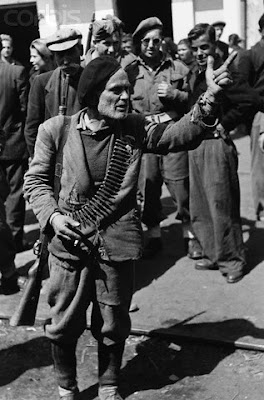"He died in prison while protesting for his right not to wear a motorcycle helmet. Now 40 years after it became compulsory to wear a helmet while heading out on two wheels, bikers are taking part in a road trip to pay tribute to a man whose name is a symbol of “exceptional sacrifice in the name of bikers’ freedoms”.
Fred was a retired maths teacher who had served in World War Two as an army dispatch rider. When it became illegal to ride without an approved helmet in 1973 he decided this was a part of the freedom he had fought for and which he was not going to give up.When fined for wearing a beret to ride, he refused to pay and tore up hundreds of subsequent fines.He also served 31 prison sentences and died in Pentonville aged 74, halfway through a 60-day sentence for contempt of court.
Some of the prison sentences were very short, as little as 24 hours on one occasion, when he was held in an unlocked police station cell and told by the desk sergeant to “bugger off when no-one’s looking”. During one prison stay he wrote: “What is a man deprived of his name, his freedom of movement taken away, his every privacy invaded, every move spied upon, locked away in a filthy cell for 23 hours out of the 24 hours - and half of these miserable hours spent in darkness?”
Fred’s face was a familiar sight at Motorcycle Action Group (MAG) demonstrations all over Wales where he would give speeches dressed in an arrow patterned prison suit. Members of the South Wales MAG, of which Fred was a well-known member, will ride in convoy from Cardiff, through Bridgend, Swansea, Pembrokeshire and Ceredigion today before arriving in Llandovery where a wreath will be laid at the statue of Prince Llewellyn ap Gruffydd, another iconic figure who fought for freedom.
South Wales MAG member Philip Neale said: “Many people will recall the extraordinary example set by Fred in defying the compulsory helmet law throughout the nineteen seventies and eighties. “Nowhere in the world has anyone made such exceptional sacrifices in the name of bikers’ freedoms. “Motorcycling is about freedom. Fred understood that. We must never forget Fred’s example lest we forget why we ride motorcycles.
“Though in every other way a law-abiding citizen, Fred would encourage the crowds he addressed to follow his example, as the law would have to be repealed if enough people simply ignored it. “Once in the dock of a magistrates court where a lady magistrate berated his lawlessness, Fred took the opportunity to remind her that if it hadn’t been for members of her sex breaking the law some years ago, she wouldn’t be sitting where she was.”
Demonstrations of support by MAG members were frequently staged outside prisons in which Fred was held and a commemoration of his efforts is made annually at the gates of Pentonville on the anniversary of his death.
He was 74 when he died from a heart attack suffered whilst in custody in Pentonville in 1984.
During his final incarceration the prison governor had warned that the harsh prison environment could be the death of him, to which Fred replied: “It doesn’t matter where a man dies but how.”
Philip said: “Whether the helmet issue is important to you or not, we all owe it, not only to Fred but to ourselves, to sustain a ceaseless call for the reform of this outrageous legislation for, as Fred wrote, ‘What is a man deprived of his freedom?’”





















































